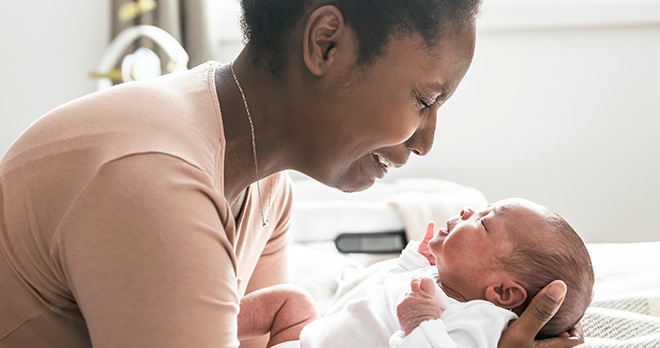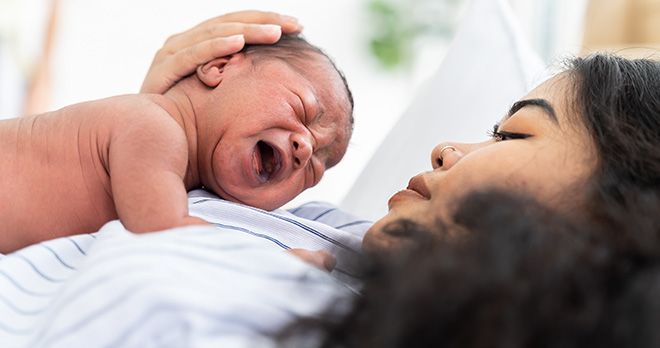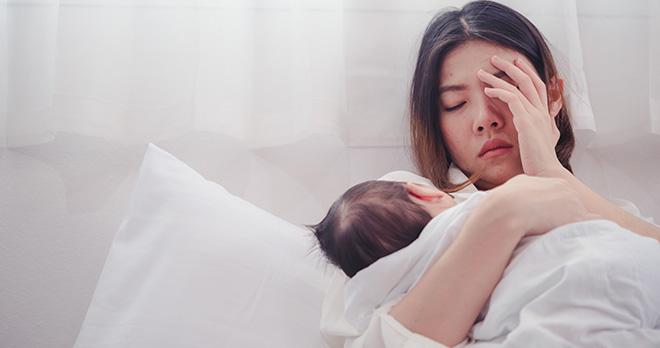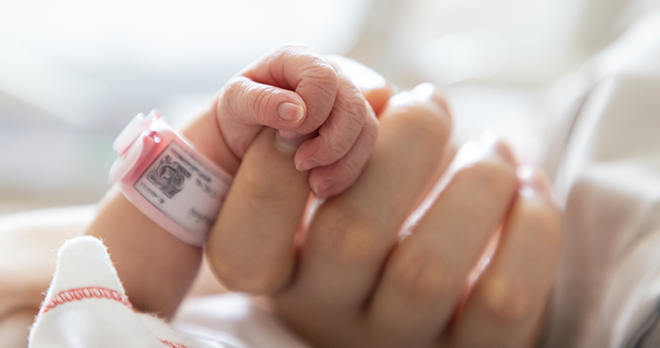In Conversation: Birth trauma, employment and how to use your voice after maternal injury
Hannah Blackwell speaks with Jo Flaherty, who featured in our What About Mum report and experienced maternal injury 18 years ago, about where she's at with her birth trauma, the support she has (and hasn't) received over the years, getting back into work, menopause and using her voice to help others.
Reflecting on birth trauma
Jo, just recapping briefly on your experience of birth trauma, how long has it been now and what stage are you at?
It’s been 18 years since I gave birth, nearly 19 years. And the stage I’m at is going into menopause, which I will touch on later. I’m revisiting quite a lot of the issues that surrounded the first birth injury. I’ve been through several surgeries; several experimental techniques; several repairs, etc. over the 18 years. But where I’m at now is in the place that I want to share all of those experiences.
Why is it important for you to for people to talk about it, now?
It’s been important for quite a few years. I think there’s a lot more people out there that understand that if we don’t talk about it- and since talking about it, I’ve met far more mothers that have had a negative birthing experience or suffered an injury, but they’ve never told anybody or spoke about it because we’re all pressurized as women to think that we walk into utopia and it’s this amazing birthing experience. And it’s almost like we failed if we turn and say, “mine was horrific, I suffered a life changing injury”. It doesn’t kind of marry up with birth. And I really want to change the narrative on it, the language, everything that we do because it just needs to be spoken about.
How would it have helped if you had someone who was talking about it then and there was potentially somewhere you could go to talk about it?
It would have meant the world to me. It would have actually been a game changer. Because I find now having those conversations, even 18 years later, I feel a lot less like a freak. Because at the time you genuinely think, “Why am I the only person that has had this happen to”. Everybody’s putting on this absolutely glitter, best face forward. And you look around and nobody’s saying, “Oh, this was awful. I need to speak to somebody. I’ve got mental health issues, I’m suffering, I’m trying to raise a baby. I’ve got incontinence issues”. It all comes in that you really fast. But you kind of keep it to yourself because you think you’re the only person with it.
So how did you manage at the time when you were going through your trauma? And I know it went on for quite a long time for you until you actually have the proper repair? What sort of support network did you have at that time or did you have one?
Yeah, I think at the time, in terms of a support network, I did have my son’s father, albeit we’re no longer together, not due to the birth injury – other reasons – but the support was not there was a complete lack of understanding. Again, “Why can’t you be like the other mums?”
I had support from my mum, in terms of my sisters, but my sisters haven’t had children. My mum’s births weren’t the same as mine. Yeah, and I, as you know, it took two years for them to even say to me, “Yeah, actually you’re not crazy”. And that is how I felt for two years. I feel like every professional I turned to gave me a reason or an excuse for the symptoms that I had. “Go away. Be quiet. Raise your child. Yes. You had a difficult birth but, you know, kind of get on with it”.
And so professional support. None. Familial support was there, but the lack of understanding. And again, social support, everyone’s like, “It’s been two years now, can you get over it?”. Was how I felt.
Did you feel isolated with it at that time?
Massively. I think we spoke about it before. I think anything related to incontinence. Stuff that, regardless of birth injury, is not something you sit down and have a cup of coffee and have a little chat about. No. So therefore, who do you talk to?
And I had some fantastic friends around me with who I could be open. But again, that was more about talking about it as opposed to having that empathy and somebody going, “Yes, you’re right, that symptom isn’t normal. I’ve had that. Oh, let’s look into that”. You know that’s not there, and you do feel on your own.
That’s changed over time?
I think in the last few years it has started to change. I think generally in terms of female health and inclusivity and the focus being and spotlight on women and equality, etc., has brought it a bit more to the front. Yeah. I also think as women we’ve started to actually reclaim it and say, “You know what, we can’t be ignored”. Because the fact of the matter is that these situations do happen and some of the injuries can be quite life taking, devastating and changing. And I think we’re trying to reclaim that, which I think is really positive.
Yeah, I think definitely. And in your experience of dealing with it, where do you feel the support was lacking?
I think for me, I wasn’t familiar with the phrase birth injury. Until somebody said to me, “You’ve had a birth injury”. It was almost like the lightbulb moment of- the word injury, kind of, put it back into the context of you feeling less like a failure. Or I did something wrong. Or something went out of my control. And I think that started to change my perspective of it.
A lot of people for me also tend to fall back on this, “Oh, your first baby?”. Even more so my first baby, as I have nothing to compare this to. I mean, I’ve been fortunate and blessed to be in the room as a birthing partner with my sister. We’ve discussed it and we’ll probably go and speak about it in the future. She herself suffered quite a severe birth injury, so that was very difficult to see. But when you say in terms of comparing the normality for her? It was amazing to have had somebody like myself that’s gone through it. And we could go through it together.
But for you both to have had that injury, that must have been, you know, for it to happen again in your family, that must’ve had a huge impact on you all?
Yeah. I think it was. I think my mum felt quite: “What could anybody have done differently?”. Yes, we were sisters, but I think 18 years, well, 15 years apart in the births. We’re anatomically different. Unfortunately there are a lot of similarities, but as I mentioned earlier in the start of this discussion, I think the birth injury is far more common than we know. So I don’t think the odds of that were actually as low as I first thought. And so in the last few years since- I think my sister’s birth injury and then seeing other things happen with my sister and me seeing in 15 years, nothing had changed really made me want to look at this.
Returning to work
Yeah. No, I can understand that when you came to – because you work in a very male dominated environment and always have, haven’t you? So when it came to going back to work with your birth injury, that was still ongoing for you as well, How did you feel about that and how did you approach going back to work?
Well, for myself, in terms of my personal and my financial situation, it was always the case that I would return to work when my son was six months old. And I think that’s one thing we’ve also got to look at in terms of having this discussion.
Yes, in a male-dominated environment and me returning to work, if I’d have sat my boss down at the time and said, “I’ve suffered a really bad birth injury and I’m incontinent, you know, I might be a bit different when I come back”, that was not going to be a conversation that would happen. I think that would’ve blown everybody out of the water and I don’t think I would have had the courage to do it. Your family still don’t understand that you expect your employer to understand it. And I think there’s a lot of support in the workplace for different topics. And again, going back to menopause that is now becoming a real focused-on topic in terms of women returning to work.
But we still don’t look at the complications surrounding birth injuries, etc. for women returning to work. It’s still first day back saying to me “How is your birth? Bet it was amazing”. Deep down, you’re like, “Please don’t ask me”. And you feel like you just have to smile.
I was dealing with not having had a recognized diagnosis of a birth injury, which was the consequence of the fourth-degree tear, I had rectocele.
I had a lot of issues- just made going back to work really bad. And I think at the beginning I could see some anxiety creeping in. But I think we tend to think we can do everything, so you just push it to one side. There wasn’t the facilities for me to have the discussion.
Nine times out of ten, my biggest panic was, “Am I going to be near the toilets? Am I going to be sick?” As in not just physically sick, but ill be able to go to work? Because characteristically I’m quite a hard worker and I get on with it. But with the injury that I had, that wasn’t always as easy as it used to be. And I would beat myself up for being that person if you couldn’t come to work that day or something like that. That was really hard.
You pack the spare pair of clothes in there in the car with one in the desk, in whatever way you’re doing the persistent breaks, you’re taking care of yourself. You’re making sure you’ve got everything in place fastidiously. But that’s what you do for you. Nobody else is doing that for you.
Did there come a point when you had to have a discussion with your employer? You had surgery didn’t you, so?
That was the first time. And bearing in mind that I returned to work when my son was six months old and I didn’t have my first surgery til he was two years old. Yeah. I’m in a place now, with a boss now who is incredible, and albeit I think it would still be difficult, I could have that conversation. I wasn’t in that position then and I was a lot younger then.
I remember quite clearly said to the lady, “Please don’t put what the surgery is in the letter that I have to give to work”. She was like, “What would you like me to put?”. I was like, “General surgery, just put general surgery. That’s all we’re going with!”.
That must’ve been a huge pressure on you to be trying to cope with them in the work environment.
I think after the first repairs, thankfully, my incontinence symptoms improved after the recovery, which was fantastic. Unfortunately, I did have quite a lot of nerve damage, and quite a lot of pelvic nerve damage, and caused me some neurological issues as well. That was harder to cover because you couldn’t have the adaptions, because I was working out on sites, you’re walking in a construction environment, your balance, etc.
And it did come to a point around ten years ago, or so, where I had to talk to my bosses and say, I have to have another surgery. This time it’s quite a big surgery. I need to take six months of this time and I can’t come back to work on a construction site. Which was devastating to me. I had to be in the office because I knew I could be safe in the office. And that was a hard decision.
Because your environment is so challenging because you’re out in construction sites as well. When you were saying that you had to go back to an office role, was that doable in your in your new career with adaptations or…?
Fortunately for me, yes, it was, because of what I could do. I had been out on sites when I was younger. When my son was born, I had offered to go back into a more office role in a more commercial environment because to me, in construction, the hours are extremely early, extremely long, and when you have a newborn baby you have to kind of look at things and see what you’re doing.
So I continued in a more office environment commercially. I loved. I did that, as I say, for quite a long time. I’ve then made a decision to go back out onto site and it was almost like a kick in the teeth when that came along. But I was fortunate I could go back into a more office role temporarily.
And now, and we’ll go on to it, with all the further interventions that I’ve had, I’m back into a role that gives me both. I’m on site all the time. I’m in an office, I do what I love. The only time I ever took a long period of work was that six months.
The menopause after birth injury
18, 19 years on from your injury. And, you know, we were always told that these symptoms can worsen around menopause and there’s a lack of support generally for women going through menopause and sometimes a lack of understanding. And that must be so much worse when you’re dealing with a birth injury and worsening symptoms as a result of that, at that time.
I should say, 15, 16 years ago they said “Be prepared in menopause. These symptoms can either return, because of the anatomy a structural repair might not be an option. And obviously the nerves don’t heal. So be prepared that you could be – when you start menopause – not back to where you started, but not far off”.
I can genuinely say I was not prepared for that absolute smash in the face. Yeah, because it literally gradually and then overnight- all of the symptoms, particularly for me (each person’s different the incontinence ones) literally just threw me in the face.
So from having had ten years, ten, 12 years, I’d say, of fantastic, you know, maintenance, incontinence, etc. management to go in the complete opposite was a massive shock.
It’s talked about something is in the future and you never quite know how it’s going to be, because it is subjective as well. But yeah, I can imagine it’s quite shocking to suddenly have these symptoms come back again?
Totally and to the level they come back. I think that’s, that’s the bit that you kind of aren’t prepared for. You are prepared for it, and like I said I feel silly because I knew. But I genuinely, I genuinely did not prepare myself for the level they returned.
Did it mean then that you were having to sort of revisit managing at work and everything else?
Yeah and it was becoming quite difficult. In the interim, as you know, I had a spinal cord stimulator fitted and again, that was an operation that- I’ve been very fortunate. I’ve met some fantastic surgeons on my recovery and that was given to me to do with pain management, nerve management, difficulty with some mobility, and it gave me fantastic lease of life.
So I was feeling in a pretty good place. I was working really hard, working really well, doing everything that I needed to do, and life was good. To then have to go, “Right? Okay, so what we’re going to do now?”. The colorectal surgeon said, “We can give you another implant, which is a sacral nerve stimulator”. He said “It might not work, but if it doesn’t, you will have- we will have to give you a stoma”. So that was difficult to face into.
Since you’ve had the worsening symptoms around menopause have you found anywhere you can go for support?
I do think the correlation between menopause and the worsening symptoms, whilst it’s understood it happens, I don’t think it’s quite understood why it happens. And my surgeon Prof. Knowles, he’s been fantastic and he’s been very honest as well. You can imagine, quite inquisitive, saying “So, why does this happen?”. And he has been very honest is that you know, some of it we know because of the structures, some of it, we don’t fully understand it. Is it hormones, etc.
So I would say for the birth injury side of things, I think the level of support has gone up, particularly in women, in professionals and in charities. But I think on the menopause link with birth injuries, it’s better spoken about and better understood, but in terms of that level of support is not as focused on. So I think we do need to pick that up.
Using her voice to help others
And I know now you’re starting to work a lot closer with MASIC. Yeah, I mean, that’s great because I think they are such a good charity. You know, it’s now focusing on all the things that were lacking when you had your injury. How did you get involved with them and how important is that work to you?
The work to me has been massively important and I am delighted to be able to get more involved. My family in terms of age being 18, 19 – we’ve touched on it – he has gone to university and is absolutely thriving, and that’s meant that for me I’ve got some more time to put into things I’m passionate about.
And I stepped forward with MASIC and said, I’d like to be an advocate and I’d like to get more involved. It was amazing to join them at the first debate. It was historic. At the Houses of Parliament that started having a discussion about birth and birth injuries. It was quite a sad day in some respects also because it was also about baby loss. So for me it’s quite- two very hard hitting topics, both of which are experienced and being in that room, listening to that historic debate, and MASIC being part of that and Birth Matters being a part of that, I thought it was so powerful.
And we took pictures outside the Houses of Parliament and from the respective charities and the mums that turned up and was there, and it just felt incredible. And, like you say, I think the resources that they bring for women is fantastic.
I will say for me, even 18, 19 years later, sitting, listening to the MP, relive her best story still got to me. And then when I looked around and there were lots of other women thinking and, and feeling the same way. Some which you know, it was quite upsetting, it kind of relit that fire again to say you just need more of this. We just need more of this. Because like you say, I have had that 18 years ago, I think my world would have been turned around.
MASIC, with their advocates, which you’re going to join them for, is brilliant. I think they’re, you know, telling the story just for people that are going through it must be so good to think, well, you know, there’s someone else that’s been through this. I’m not alone, you know, it’s not me. And there is support out there. It’s so important.
I think for me, genuinely, if I had one person that said to me, “Listening to what you said made me go look at that, or change that, and it made it better”. That’s all I think we need to look for because yes, up in the professional services, in the medical understanding, the medical services is phenomenal and is such a big important part.
But we need to look at the language. We need to look to the support system, the network. We need as women to regain the narrative and start having an honest and open conversation and not be made to feel we did something wrong or that we’re imagining it. And I think if like I say, listen to the stories of the advocates, people are sitting going, “That’s me. Wow. Okay. Let’s look at this”.
I don’t think people generally realise how powerful language is in this maternity birth setting. The amount of clients that have said to me they remember something that was said to them after birth. And, you know, it’s just a few words. You know, the clinician probably doesn’t remember at all afterwards, but it’s very hard hitting as a patient to listen to and those words stick. And so I think we have to be really careful about language that’s used.
Oh, yeah, I could not agree more. We spoke to you about it for me 18 years ago.
To this day, I hear ringing through my head, “If the baby’s not out in 20 minutes, I’m coming back with the forceps”.
It’s threatening language, isn’t it?
It is. And you’re thinking, “I am trying my best”.
And if someone says that to you, you think “There’s “something I’m not doing effectively, then, if you’re going to have to come in and do that”.
And bearing in mind, with hindsight, I had a baby that was stuck with shoulder dystocia. A weight that should never have been delivered vaginally. And again, that’s hindsight, but at the time I’m sitting there as a young woman going, “Well what am I doing wrong, what am I doing different to everybody else?”.
Which shouldn’t be- you shouldn’t be having those thoughts at that time.
And I know we talked before and you were saying one thing that came out of the debate in parliament for you, that you felt was really important, was not focusing on this term of ‘natural birth’ because what is that and what pressure does that put on people? And we should be looking at an ‘optimum birth’ where mother and baby are safe and walk away from it in the best possible way afterwards.
I appreciate everybody has their different beliefs and how they’d like to approach it, but I do think that word ‘natural’ is kind of making you feel that if you don’t do anything else but, that you’ve done it wrong. And that’s a real big emotive piece of language that I think gets carried through birth.
I think we’re still not explained properly the risks of childbirth. And on the last videos we done together, I said “If you knew what I knew now, if somebody asked me to write a birthing plan now, I would 100% want to do everything that was for my child, make sure my child’s okay. But I would also consider, “For me as my child’s mum, put your own oxygen mask on first”.
What could I say to ensure that I was protected from an injury that could be life limiting or affecting?
I don’t think we should scare people. I just think we should inform people with the knowledge so they can make the right decision- not the right decision, that’s wrong and I’ll pull myself up on that: so they can make an informed decision.
It doesn’t need to be, you know, like when you go for general surgery that there’s a 90% risk you’ll die. I think it needs to be contextual in terms of, you know, risks of tears, the understanding of tears and the new legislation that will put it into hospitals as standard etc.
I think all of this is fantastic, because if you would have said to me 20 years ago, “Oh gosh, you don’t want to get a fourth-degree tear”. I’d be thinking, “I genuinely do not have a clue what you’re talking about”.
Would you say anything to people that know in a position now where they’re approaching the menopause, you know, having suffered a birth injury previously? Having just gone through it yourself I can imagine it must make you feel isolated in way managing the symptoms? Would you give advice, when you’re in that situation, of where to get support or what to do? Is there something that helped you?
Yeah, I think the very first thing I would say is don’t doubt yourself. Because I genuinely, I know I keep saying it, I knew, as part of the experience we had together and we shared together and the experts that I spoke to: every single person told me this would happen. I think, though, you go back to that default like I did in the first two years of being told, “There’s nothing wrong with me, you know, you had your baby, it was a bit difficult. But come on”. You have to trust yourself. And it’s difficult to admit that something you thought was better or going away has come back, because you knew what the impact was the first time.
So I do think speak to people around you. I can honestly say I’m blessed to have my husband because I would ask him questions. I would say, “Is that happening a lot more? Have I mentioned that a lot more, or is this happening?”. And I would then, once I had that information, my advice would be whichever means is available to you, start speaking to medical professionals particularly if it is altering the way you are living your life. Because as I mentioned, I was fortunate I had a sacral nerve stimulator fitted. I was very lucky it worked brilliantly. I haven’t had to have a bag. As long as that will work, that’s great. But that took a lot of courage to even admit that there was a problem that required the intervention.
So my first bit of advice is, be honest with yourself and ask the people around you. Don’t go back to my personal experience with don’t go back to that place where you completely doubt yourself.
And just now, since what’s happened to you and everything that you’ve been through, you’ve formed links with MASIC that we’ve talked about and you’re going to be working for them with this on advocate, which is great. And you’ve had some contact with Bowel Research UK. Is there anything about their work that you would want to highlight?
I think what I’d like to highlight about that work is, I didn’t really think that I would have much of an impact with just my story, but I would like to highlight that I am amazed at the impact that you have with your story.
And the thing I’d like to highlight is that talking, even if you visit the websites or you’re worried about something; they have got so many amazing people, not just my story, everyone’s story, on there. And if you just one day are thinking, “You know, I’m not sure”, that’s why I’d like to highlight. There are people there. You are not a single voice.
There are so many people now who are coming together and we are becoming a powerful voice. The debate in Parliament: that came from an MP experiencing birth trauma and going, “I’m going to use my voice”. And that is where I think for me I’d like to highlight it.
We’re all entitled to that voice. We just haven’t been encouraged to use it.
Contact our team to find out whether we can help you make a claim for compensation.
Call now








